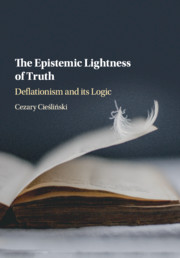Book contents
- Frontmatter
- Contents
- Acknowledgements
- Introduction
- 1 Preliminaries
- 2 Approaches to Truth
- Part I Disquotation
- Part II Conservativity
- 6 (Non)Conservativity of Disquotation
- 7 CT− and CT: Conservativity Properties
- 8 Other Compositional Truth Theories
- 9 Conservativity: Philosophical Motivations
- 10 Maximal Conservative Theories
- 11 The Conservativeness Argument
- Part III Reflection Principles
- Afterword
- Glossary of Symbols
- Bibliography
- Index
11 - The Conservativeness Argument
from Part II - Conservativity
Published online by Cambridge University Press: 30 November 2017
- Frontmatter
- Contents
- Acknowledgements
- Introduction
- 1 Preliminaries
- 2 Approaches to Truth
- Part I Disquotation
- Part II Conservativity
- 6 (Non)Conservativity of Disquotation
- 7 CT− and CT: Conservativity Properties
- 8 Other Compositional Truth Theories
- 9 Conservativity: Philosophical Motivations
- 10 Maximal Conservative Theories
- 11 The Conservativeness Argument
- Part III Reflection Principles
- Afterword
- Glossary of Symbols
- Bibliography
- Index
Summary
As mentioned earlier, the conservativeness demand was proposed not by the deflationists themselves but by their critics, who subsequently used the demand in their argumentation against deflationary conceptions of truth. According to the critics, the deflationary truth theory should but cannot be conservative – that is the general upshot of the (so-called) ‘conservativeness argument’.
I have already discussed the reasons for ascribing conservativity doctrine to the deflationists. My conclusions have been sceptical; that is, the justifications for it are very weak. Nevertheless, I have also concluded that conservativity would be a useful property; in addition, it has been emphasised that syntactic conservativity could still well function as a new explication of the lightness doctrine. In view of this, I find the conservativeness argument to be worth considering. If nothing else, its validity would convince us that this road is closed; that the attractive property in question is inaccessible to the adherent of the ‘lightness of truth’ doctrine.
In Chapter 5 the basic problem has been described concerning the strength of truth theories, which – if real – seriously restricts our choice of such theories. The problem is that even if we take for granted that truth permits us to express generalisations, the question still remains about the point of our being able to express them. Why should we want the generalisations to be expressible in our language if we do not have the slightest idea of how to arrive at them – if we are not in a position to reasonably assert them – or, in formal contexts, to prove them?
As I take it, that is exactly the starting point of the proponents of the conservativeness argument. First, without proving basic generalisations involving truth, our theory makes the predicate pretty useless. Second, weak theories of truth do not fit with the facts of the actual usage of the truth predicate, both in mathematics and in colloquial discourse. The issue is that we do actually formulate and accept some fairly general truth principles. The perspective on truth which does not take this into account would make a lot of our practice incomprehensible.
- Type
- Chapter
- Information
- The Epistemic Lightness of TruthDeflationism and its Logic, pp. 183 - 202Publisher: Cambridge University PressPrint publication year: 2017



